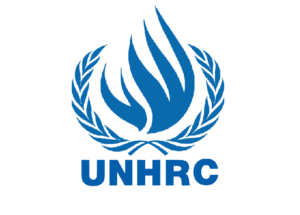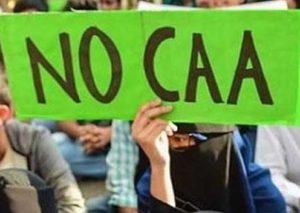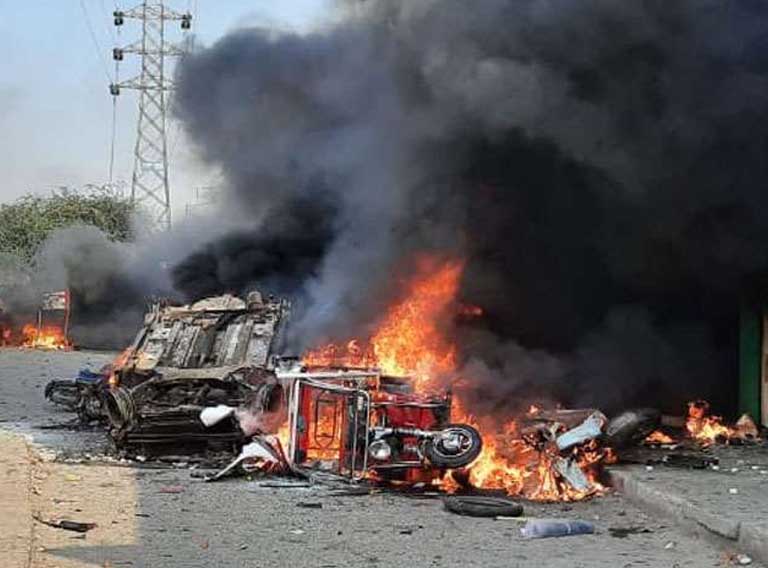UN Human Rights Council moves Supreme Court on CAA, India on back foot
In a first, the Office of The High Commissioner for Human Rights knocks India’s Supreme Court against the maintainability of CAA, putting Narendra Modi’s BJP-government on the back foot. For donkey years, human rights groups, national and regional identities have been shouting from rooftops that the United Nations must pro-actively intervene to protect and preserve human rights in India. The Sikhs, Kashmiris, Tamils, Nagas, Manipuris and the Tripura people have been crying hoarse for international intervention. Finally, we are there, with specific thrust on the internationally applicable principle of non-refoulement.
![In a first, the Office of The High Commissioner for Human Rights knocks India’s Supreme Court against the maintainability of CAA, putting Narendra Modi’s BJP-government on the back foot. For donkey years, human rights groups, national and regional identities have been shouting from rooftops that the United Nations must pro-actively intervene to protect and preserve human rights in India. The Sikhs, Kashmiris, Tamils, Nagas, Manipuris and the Tripura people have been crying hoarse for international intervention. Finally, we are there, with […]](https://www.theworldsikhnews.com/wp-content/uploads/2020/03/Michelle-Bachelet-UNHRC-Chairperson-360x162.jpg)
I N A LANDMARK DEVELOPMENT, LIKELY TO IMPACT THE WAY THE INDIAN STATE PERCEIVES ITS INTERNATIONAL RESPONSIBILITY at the United Nations towards the comity of nations and the world community, the dynamic, persuasive and unrelenting chairperson of the UN Human Rights Council Michelle Bachelet has sought to become an amicus curaie in the bunch of petitions against the constitutionality and the divisive nature of the Citizenship Amendment Act, 2019, passed by the Narendra Modi-led Bharatiya Janata Party government.
The provisions of this law have attracted massive internal opposition and tremendous international flak much to the chagrin of the right-wing BJP government which considered it their inherent right to convert India into a Hindu country and push black laws and anti-minority measures.
The CAA has led to widespread protests across India. Soon after the massive BJP loss in the Delhi elections, in a planned pogrom, there have been deaths of scores Muslims in North East Delhi and the numbers are still pouring in. The climate of hate has been given more impetus by right-wing politicians. Trained and groomed lumpens and biased police have colluded with the state in spreading mayhem and murder in broad daylight in the last week of February 2020.

Human rights campaigners across the globe have been waiting for this move by any of the organs of the United Nations for decades. A former Indian Foreign Service officer Deb Mukherjee and others have filed an interventionist petition on 3 March 2020, which will go a long way in moulding the thought processes of India towards the world and vice versa.
Notwithstanding the international opprobrium against the CAA and the carnage against Muslims as a result of the systemic hate-mongering, the reaction of the government of India is no different than what has been since decades. The stock reply is, “No one should interfere. This is an internal matter of our country.” Speaking to the media, Raveesh Kumar -the spokesperson of the Ministry of External Affairs of the Government of India said, “We strongly believe that no foreign party has any locus standi on issues pertaining to India’s sovereignty.”
Commending some sections of the CAA, the UN Human Rights Council -UNHRC has expressed concern about the compatibility of Section 2 and 6 of the Citizenship (Amendment) Act 2019 with the Indian Constitution in this petition.
Reiterating its oft-repeated stand, the Indian MEA said, “India is clear that the CAA is constitutionally valid and complies with all requirements of its constitutional values. It is reflective of our long-standing national commitment in respect to human rights issues arising from the tragedy of the partition of India.”
“India is a democratic country governed by the rule of law. We all have the utmost respect for and full trust in our independent judiciary. We are confident that our sound and legally sustainable position will be vindicated by the Supreme Court.”
A bunch of more than a hundred and forty petitions are pending in the Supreme Court of India on the CAA, NPR and NRC. Those who have petitioned include activists Mahua Moitra, Assasudhin Owaisi, Jairam Ramesh, Indian Union Muslim League, The Siasat Daily, the PUCL, Kamal Hasan, Tehseen Poonawala, Ramesh Chennithala, SDPI and Harsh Mander. Prominent political parties like DMK, CPI have also petitioned. The Tripura People’s Front is also a petitioner.

In an attempt to apprise the judges of the Supreme Court of India of the stand of the government of India, Raveesh Kumar of MEA stated, “India is a democratic country governed by the rule of law. We all have the utmost respect for and full trust in our independent judiciary. We are confident that our sound and legally sustainable position will be vindicated by the Supreme Court.”
The UNHCR chief Verónica Michelle Bachelet Jeria, -former President of Chile, its first female President, was along with her father subjected to torture by the Pinochet government. A doctor by profession and a former head of the UN Women, she steadily earned her present position and hence is aware of how repressive governments work. She knows her job in upholding human rights for all at all places at all times and under all circumstances.
“Citizenship Amendment Act adopted last December is of great concern. Indians in huge numbers, and from all communities, have expressed – in a mostly peaceful manner – their opposition to the Act, and support for the country’s long tradition of secularism.”
It is this background that prompts her into bold intervention in various fora including the present one in the Indian Supreme Court to tell India how the CAA flouts international obligations under India’s commitment to UN treaties, conventions and international laws.
Within mincing words, in her opening remarks at the inaugural session of the 43rd Session of the UN Human Rights Council, she said, “Citizenship Amendment Act adopted last December is of great concern. Indians in huge numbers, and from all communities, have expressed – in a mostly peaceful manner – their opposition to the Act, and support for the country’s long tradition of secularism.”
Citing the importance of the role of the Office of the High Commissioner for Human Rights, the petition says, “The High Commissioner’s role is thus to promote adherence to international human rights law and, with this purpose in mind, to support domestic courts, with their constitutional or judicial function, in ensuring the implementation of international legal obligations.”
As regards her pro-active role, the petition says, “The current High Commissioner and her predecessors have filed amicus curiae briefs on issues of particular public importance within proceedings before a diverse range of international and national jurisdictions, including at the international level, the European Court of Human Rights, the Inter-American Court of Human Rights, the International Criminal Court, and at the national level, the United States Supreme Court and final appeal courts of States in Asia and Latin America.”
“The examination of the CAA in the present case raises important issues with respect to international human rights law and its application to migrants, including refugees. The examination by the Hon’ble Court of the CAA is of substantial interest to the High Commissioner, considering its potential implications for the application and interpretation of India‘s international human rights obligations, including the right to equality before the law and the prohibition of discrimination as well as the CAA’s impact on the protection of human rights of migrants, including refugees in India.”
“The current High Commissioner and her predecessors have filed amicus curiae briefs on issues of particular public importance within proceedings before a diverse range of international and national jurisdictions, including at the international level, the European Court of Human Rights, the Inter-American Court of Human Rights, the International Criminal Court, and at the national level, the United States Supreme Court and final appeal courts of States in Asia and Latin America.”
Sharply bringing India’s international obligations into focus, the petition reads, “Special attention is given to the core international human rights treaties to which India is a State party, including the International Covenant on Civil and Political Rights (ICCPR) the International Covenant on Economic Social, and Cultural Rights (ECESCR), the International Covenant on the Elimination of Racial Discrimination (ICERD), the Convention on the Rights of the Child (ICRC) and the Convention on the Elimination of Discrimination against Women (CEDAW).”

The present intervention “seeks to provide this Honourable Court with an overview of the international human rights norms and standards with respect to States’ obligations to provide international protection to persons at risk of persecution in their countries of origin; the enjoyment of human rights by all migrants; and the right to equality before the law. equal protection of the law and the right to non-discrimination…. The CAA also raises other equally important human rights issues, including its compatibility in relation to the right to equality before the law and non-discrimination on nationality grounds under India‘s human rights obligations. While the issue of non- discrimination on nationality grounds falls outside the scope of this intervention, this in no way implies that there are not human rights concerns in this respect.”
The petition has reminded India that, “All migrants regardless of their race, ethnicity, religion. nationality and/or immigration status enjoy human rights and are entitled to protection. The principle of non-discrimination, as well as that of equality before the law and equal protection before the law without discrimination, are firmly anchored in international human rights instruments and farm the foundation of the rule of law.”
UNHRC says, “The principle of equality also requires that States adopt special measures to eliminate the conditions that cause or help perpetuate various forms of discrimination.” Also, “Indeed, international human rights law does not distinguish between citizens and non-citizens or between different groups non-citizens, within the jurisdiction of a State party in their equal right to enjoy protection from discrimination and be equal before the law.”
Pinpointing the need for abolition of discrimination under UN treaties and conventions, especially the ICPCR, the petition notes that, “Indeed, international human rights law does not distinguish between citizens and non-citizens or between different groups of non-citizens, within the jurisdiction of a State party in their equal right to enjoy protection from discrimination and be equal before the law, including in respect of their migration status.”
The petition has observed that the United Nations General Assembly has also consented that States should avoid invidious discrimination in the immigration context and India too has accepted to comply with this. The principle of non-refoulement under international human rights law and the obligation to carry out an individualized assessment.
In this connection, the Human Rights Committee, the authoritative body overseeing the interpretation of the ICCPR has stated that “the general rule is that each one of the rights of the ICCPR must be guaranteed without discrimination between citizens and aliens. Aliens receive the beat of the general requirement of non-discrimination in respect of the rights guaranteed in the Covenant, as provided for in Article 2 thereof This guarantee applies to aliens and citizens alike and that “aliens are entitled to equal protection by the law.”
“Covenant rights is not limited to citizens of States Parties but must also be available to all individuals, regardless of nationality or statelessness, such as asylum seekers, refugees, migrant workers and other persons, who may find themselves in the territory or subject to the jurisdiction of the State Party.”
The petitioners have pointed out that, the Committee on the Elimination of Racial Discrimination has specifically called on States to “Ensure that particular groups of non-citizens are not discriminated against with regard to access to citizenship or naturalization …” It has additionally found discriminatory immigration laws and policies “incompatible with the very principle of non-discrimination.”
The petition has observed that the United Nations General Assembly has also consented that States should avoid invidious discrimination in the immigration context and India too has accepted to comply with this. The principle of non-refoulement under international human rights law and the obligation to carry out an individualized assessment.
The principle of non-refoulement is enshrined in international human rights law, international refugee law, international humanitarian law and customary international law. Since it was formally codified in the 1951 Convention on the Status of Refugees, it has been developed and integrated into international human rights instruments. Among other treaties, this principle is enshrined in the Convention on the Rights of the Child (CRC) and implicitly established in the International Covenant on Civil and Political Rights (ICCPR).
The principle of non-refoulement under international refugee law prohibits return in any manner whatsoever to threats to life or freedom on account of five grounds, including but not restricted to religion. Under international human rights law return is prohibited where there is a real risk of the individual suffering “irreparable harm”, which is a concept broader than persecution and does not require that the risk of harm be linked to specific grounds.
Specifically, the Office of the High Commissioner of Human Rights has asked the Supreme Court of India to “take into account international human rights law, norms and standards, in these proceedings related to the CAA, so important for India and the diverse communities it has welcomed.”
Under international human rights law, the principle of non-refoulement prohibits the expulsion, return or extradition of a person in the territory of a State or under its jurisdiction or effective control to another State when there are substantial grounds for believing that the person would be in danger of being subjected to irreparable harm, such as violations of the right to life, torture, ill-treatment and enforced disappearance, among others. This principle applies to all forms of expulsion or return of persons, regardless of their nationality, legal status, immigration status, statelessness or citizenship. It is an absolute principle from which no derogation is possible.
Specifically, the petitioners have asked the Supreme Court of India to “take into account international human rights law, norms and standards, in these proceedings related to the CAA, so important for India and the diverse communities it has welcomed.”
Whatever the outcome -the Supreme Court of India may accept it or may not accept the petition on the question of locus-standi, but the United Nations Human Rights Council chief Michelle Bachelet has taken the first concrete step -a unique occurrence in the annals of the contemporary history of nations who suffer gross human rights abuse.

One thought on “UN Human Rights Council moves Supreme Court on CAA, India on back foot”